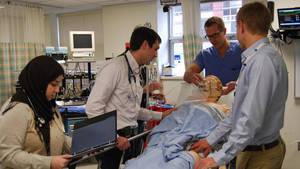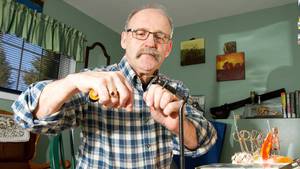Learn more about memorial donations |
|
Making health care your concern is a warm and meaningful way to remember a loved one or cherished friend. Memorial donations can be designated to a specific medical discipline or to the area of greatest need within the QEII. When you make a contribution to the QEII Foundation, you have the assurance of knowing your gift will benefit patient care through purchasing medical equipment, funding special projects, promoting education and advancing research at the QEII. For more information, visit: QE2Foundation.ca |
After undergoing life-saving surgery at the QEII Health Sciences Centre, Bedford resident Michael Covert knew he wanted to show his appreciation. He decided to donate to the QEII Foundation, but not through a regular monthly payment or a one-time sum — he had a different idea.
“If anyone I knew had a relative or friend pass away, I started sending a cheque for $100 to the QEII Foundation — in the memory of the person who had passed away,” says Michael. “When someone’s loved one dies I send a note to inform them that I have made a donation in the name of the person who passed away.”
He’s donated on behalf of people he barely knows — and people he’s never met. He’s donated on behalf of a past girlfriend, after her husband passed away. As long as Michael has a connection to the person, he makes the donation.
Once the Foundation receives the donation, they mail an acknowledgement note to the person Michael has specified. He says the recipient is usually very surprised and touched by the gesture — and he often receives a kind note in response.
Since 1999, he’s donated $42,525 to the QEII Foundation — that’s 422 individual gifts averaging around $100 each.
It all began after Michael underwent major surgery to remove a growth in his parathyroid. During the procedure, his doctor discovered he had hypertrophic cardiomyopathy — a muscle obstruction that was squeezing his heart and preventing it from pumping properly, a hereditary condition.
He underwent another surgery, and was fitted with a defibrillator. If his heart rate went up, it would check in and adjust it. It would also kick in if his heart rate dropped.
The units are more than $25,000 a piece, and so far Michael is currently on his second. He goes into the Halifax Infirmary site of the QEII once a year for an echocardiogram, and also gets his defibrillator checked.
Without the doctor’s care and attention, Michael says he would never have known he suffered from hypertrophic cardiomyopathy — and been outfitted with the defibrillator that keeps him alive.
“I think I donate to the Foundation because I know how much things cost, and how important they are,” says Michael. “The hospital — and the entire medical system — is very valuable to me.
“I think the QEII is a great place.”
The 77-year-old is retired, but says he doesn’t think of himself that way. He sold life insurance for 25 years, and now keeps busy by staying active in the community.
Michael is a volunteer member of Bridgeway Academy’s Board of Directors, where he supports students with learning disabilities through the Mary Jane Covert Bursary — named for his younger sister who died when she was two months old.
He’s on the board of Callow Wheelchair Bus, a non-profit corporation that transports physically-challenged individuals to community activities. He reads at Saint Mary’s Basilica during the Friday noon mass, and the Saturday 4 p.m. mass.
In 2010, he was named as one of 100 exceptional volunteers who make outstanding contributions towards strengthening HRM communities.
“I need to keep busy. It’s important to me.”
Michael says the inspiration to donate to a cause may strike him at any point during his day. He walks his dog over a mile every morning, and got to know a woman who also walked her dog in the area. Her dog recently died, so he donated $100 to the SPCA in her name.
Before he donates to a cause, he says he gets involved and does his research — attending meetings, if possible, to learn more about how his donation could help.
“It’s important to listen. If more people listened to what other people were saying, the world would be a better place to live.
“It can be difficult to convince people to give — even if it’s just $20 on a regular basis,” says Michael. “But someone once told me ‘Give all of your money away now, before you die,’ and that’s what people need to do.
“You certainly can’t take it with you.”








